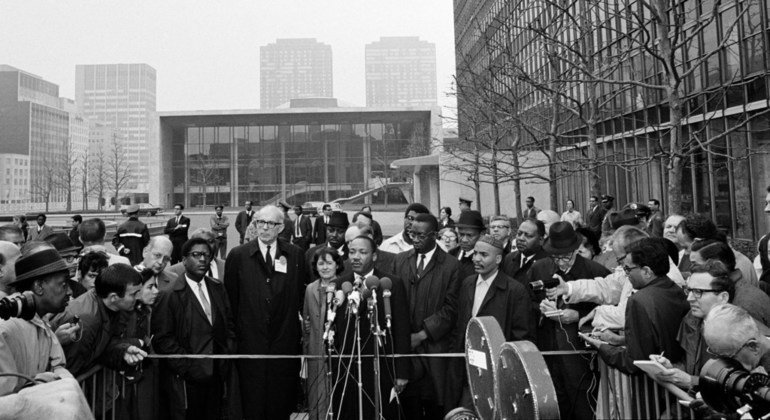Stories from the UN Archives: The Origins of ‘No Justice, No Peace’ in the 1960s


On April 15, 1967, a delegation led by Dr. King met with the legendary Ralph Bunche and other senior United Nations officials. Mr. Bunche was the first African American to receive the Nobel Peace Prize, and Dr. King was the second.
On the occasion of International Day of People of African DescentHeld annually on August 31, check out this archived account of Mr. Bunche, a UN legend, below:
During a crucial meeting with United Nations officials, Dr. King presented a petition, calling for an immediate and peaceful solution to the conflict in Vietnam (1961-1975).
Earlier in the day, he marched with 125,000 protesters in the first of many marches against the conflict.
Watch United Nations Video Stories from the United Nations Archives Movie about world famous civil rights activist below:
‘There is no justice without peace, no peace without justice’
Outside the United Nations Headquarters in the spring of 1967, Dr. King read aloud the petition, which to this day echoes the call for peace in the ongoing wars around the world.
“From towns and villages, cities, schools and farms, we came by the tens of thousands to march and demonstrate at the United Nations in New York and at the birthplace of that world organization in San Francisco on April 15, 1967,” he said. “We who participate in this unprecedented national demonstration for peace, though of diverse national origins, creeds and political hues, are united in our conviction of the urgent need for an immediate peaceful solution to an unjust and unjustifiable war.”
“We are determined to stop the killing and avoid nuclear catastrophe,” he said. “We gather at the United Nations to reaffirm our support for the principles of peace, universality, equal rights and self-determination of peoples enshrined in the Charter and recognized by humanity, but violated by the United States.”
Regarding the priorities of the peace movement and the civil rights movement, Dr. King said that “in substance, these issues are inextricably linked.”
“Ultimately, there can be no peace without justice, and there can be no justice without peace,” he said.
Inspiring the next generation
The civil rights leader continued to fight for peace throughout the final years of his life before being assassinated in 1968, exactly one year after he visited the United Nations Headquarters. His anti-war activism cemented the connection between conflict abroad and injustice at home in the United States.
Dr. King’s Lifelong Efforts, From the March on Montgomery to His Icon i have a dream speech in Washington, inspired future generations, including his granddaughter. Earlier this year, 15-year-old activist Yolanda Renee King resolved an audience in the General Assembly Hall during a special memorial service International Day of Remembrance for the Victims of Slavery and the Transatlantic Slave Tradeheld annually on March 25.
“Today, I stand before you as a proud descendant of slaves who fought against slavery and racism like my grandparents, Dr. Martin Luther King Jr. and Coretta Scott King,” she said from the blue marble podium in the Capitol Hall.
“My parents, Martin Luther King III and Arndrea Waters King, also dedicated their lives to ending racism and all forms of bigotry and discrimination,” said the author of the newly released children’s book. We dream of a worldto pay homage to her famous grandparents.
“Like them, I am committed to fighting racial injustice and continuing the legacy of my grandparents who fought for social justice and equality,” said Ms. King, calling on young people around the world to take action.
“We must connect across the internet and organize across national borders around the world. This will open up new possibilities for global campaigns to promote human rights and social justice in every country. I hope that my family’s legacy of social justice advocacy will inspire my generation to take action and confront the issues that affect our world.”
See her full statement below:
Stories from the United Nations Archives
United Nations News Presenting monumental moments in the history of the United Nations, built from United Nations Audiovisual Library49,400 hours of video and 18,000 hours of audio.
United Nations Video Update Stories from the United Nations Archives playlist This and our accompanying series This.
Join us next time for a deeper dive into history.


